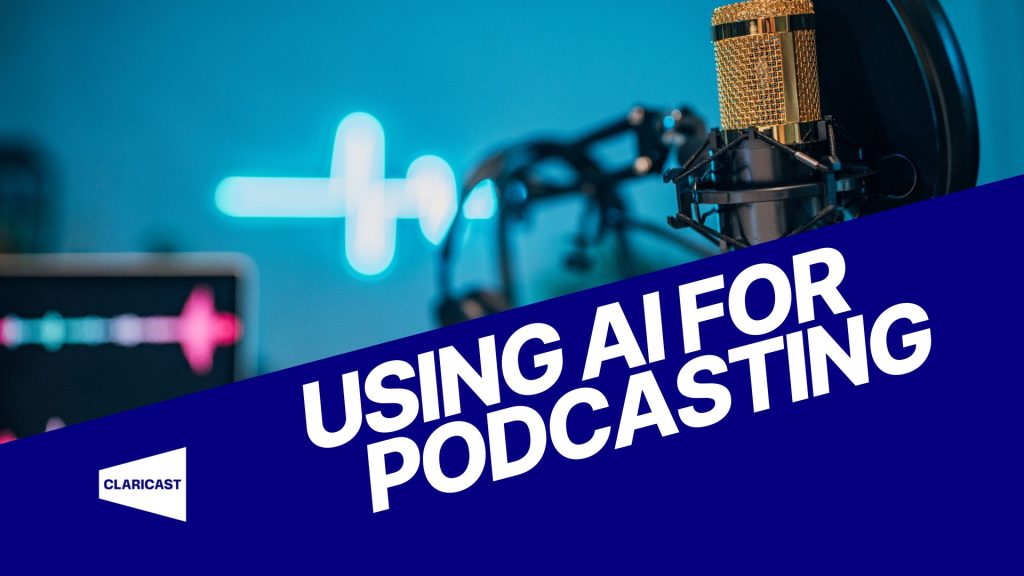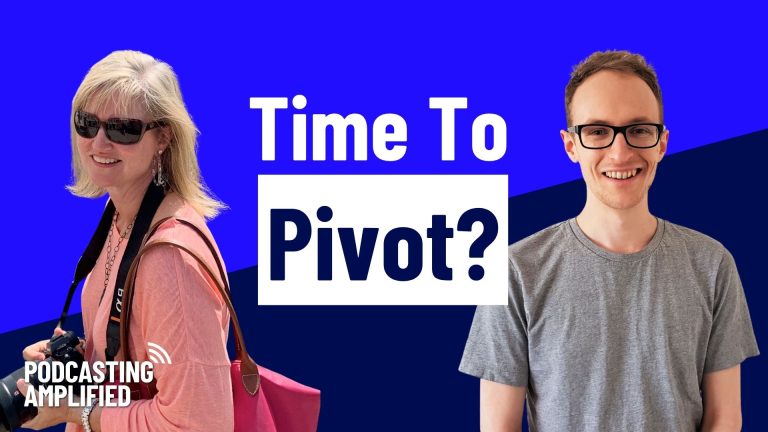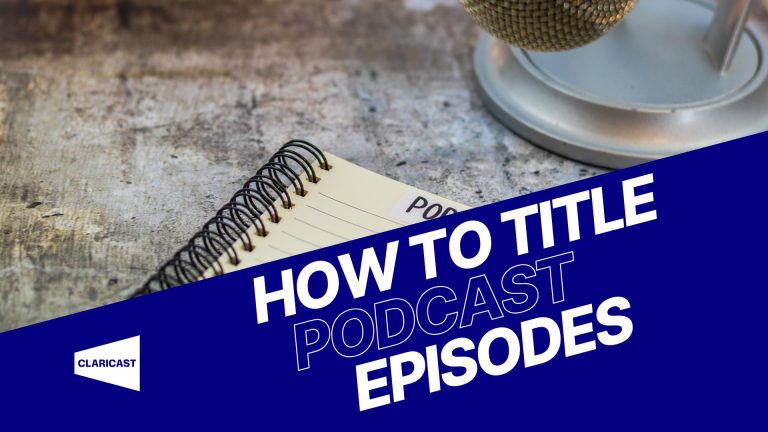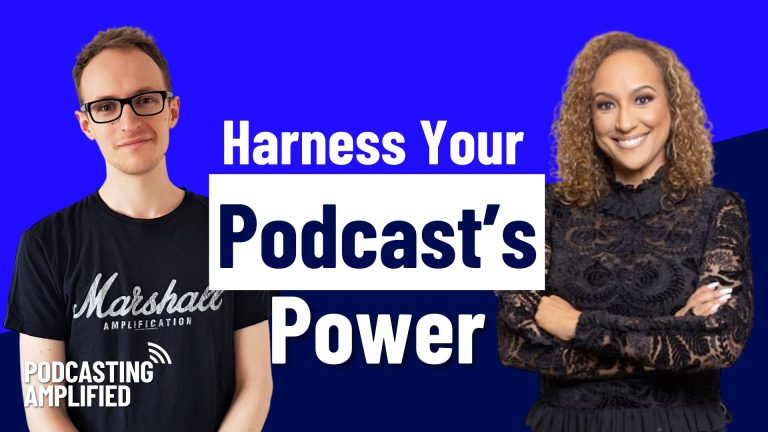The AI floodgates have opened. And it looks like they’re going to stay that way. The use of advanced AI tools has opened up new opportunities for content creators. And the use of AI for podcasts is no different.
AI tools aren’t a novel concept. They’ve been around for many years in audio restoration software, chatbots and more. What is new, is the cutting-edge generative AI technologies like ChatGPT, voice synthesis and significantly more advanced analysis tools.

In this post, we’ll explore the dos and don’ts of using AI for podcasts. There are ways of using AI to make your life easier and to enhance your content. On the flip side, many podcasters are rushing to extract every time-saving benefit from AI, at the expense of quality and identity.
There are millions of podcasts out there. Your podcast needs to stand out to your ideal listener. Your content needs to not be boring. Content for content’s sake is pointless and won’t help your podcast grow.
Let’s find out how to leverage AI to save you time, whilst ensuring you’re not falling into the trap of boring, unfocussed content for content’s sake. Each suggestion includes a ‘human touch’ to keep in mind to ensure that you’re maintaining the authenticity that your podcast needs to stand out.
Ways to Use AI for Podcasts
Launch Planning
Launching a podcast takes a lot of work and it can be tricky to do it all on your own. Text-generating AI like ChatGPT can help you brainstorm podcast ideas and name ideas. It can also help you to write your description and tagline.
The Human Touch
Feed the bot with the information it needs. There’s no point in asking ChatGPT – “give me a name for my podcast.” In your query, include details of what your podcast is about, its format and your ideal listener. Better yet, brainstorm and come up with your own ideas and give ChatGPT the best ones as a starting point. Then, consider the responses as a guide.
The AI doesn’t know what will resonate with your audience. Nor does it know if a name is already taken, so do your due diligence.
Episode Ideas
It can be difficult to keep up with the rollercoaster that is your podcast production schedule. And coming up with episode ideas can sometimes be a challenge, especially once you’ve been podcasting for a few years.

By giving ChatGPT details about your podcast, and perhaps a list of episodes you’ve created so far, it can churn out a list of ideas for you to help trigger your creativity.
The Human Touch
As always, consider your ideal listener. Which episode ideas would give them the most value? Which ones have you already covered or can you approach them from a different angle? Also, this doesn’t work so well for interview podcasts where it’s more about making connections with people who you feel would be a good fit.
Transcription and Subtitles
AI transcription services like Otter.ai can save you hours of manual work by converting your recordings into text. Transcriptions can be useful for accessibility reasons and documentation.
The Human Touch
Go through your transcription in full, correcting any mistakes and improving cohesion. AI transcription tools tend to take you 80% of the way there, but often can’t recognise proper nouns, fast speaking and more. You could find that it’s completely messed up the intention of what a speaker was going for – which could be a big problem!
Taking Notes During Interviews
AI-powered note-taking tools like the AI summary in Zoom can again, save you time and help you stay focused on the conversation. It also keeps pen scratching and key clacking from being recorded!
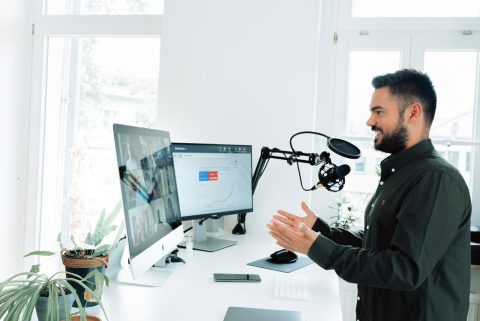
The Human Touch
Again, avoid copying and pasting these notes verbatim. It’s not going to be writing prose. Use these notes as you would the notes in your notepad.
Creating Clips/Audiograms
Audiograms (visualisations of your podcast audio) and video snippets are fantastic for getting eyes on your podcast on social media. Tools like Headliner will create AI generated subtitles and waveform animations for your snippets.
Other tools like Choppity will suggest clips for you using AI while still giving you editing flexibility. This can be useful for podcasters without the time or budget for professional editing.
The Human Touch
As with any AI transcriptions, you’ll need to manually go through them correcting and adjusting. And with AI suggested video clips, be sure to keep your ideal listener in mind and do some manual editing if you can.
There’s no point in putting out clips that aren’t captivating to your ideal listener. They need to grab their attention and get them wanting more. AI alone can’t consistently create the perfect clip for your ideal listener (not yet, at least…).
Ways to NOT Use AI for Podcasts
Editing
AI-powered audio editing tools exist, but they are not capable of crafting a polished podcast. Tools like Descript can be used for easier editing for those without the budget to outsource editing to a professional editor. It can cut out filler words and dead air using AI.
However, editors will still need to manually edit through the whole episode. AI editors are following a few basic rules but they’re not considering what the listener is hearing.
Editing entails so much more than this. And it has to be done in an unintrusive way, which today’s AI is not yet capable of. Editing also needs to consider the intention, personality and emotional depth of your content.
Writing Show Notes
Show notes are a crucial part of growing your podcast. They draw in listeners and can be repurposed as blog posts and social posts. AI-generated show notes are generic. They lack the context and insight that a human touch can provide, leading to a disconnect with your audience. They aren’t able to match your tone of voice or have an understanding of what they should include and what they shouldn’t.
You could use an AI show notes generator to write your show notes and then go over them yourself. However, the amount of work that goes into the rewrite negates the time-saving benefits of using AI.
Audio Mixing/Production
AI can assist in audio enhancement and noise reduction, but the results it produces are subpar. Great audio quality helps your podcast stand out from the crowd and exemplifies your brand.
AI audio production is like using a hammer for a job that requires a scalpel. It’ll remove the noise for you and balance the levels, but it tends to crush the audio quality in the process…

Music Creation
AI can generate custom music for your intro/outro, giving your podcast a unique sound. The music it generates tends to sound very generic itself, though, and there will usually still be a cost involved. With millions of songs available on platforms like Epidemic Sound (and there are free options) you can usually find a song that’s right for your podcast and isn’t used by another podcast in your niche.
Alternatively, if you do want something completely unique, take a look on freelancer sites like Fiverr. Musicians will be happy to create a custom song for your exact needs. And often, it won’t even cost you any more.
Voice Synthesis for Hosting/Interviews
Never use AI to replace human guest interactions entirely. What is even the point of podcasting at this stage?
In your niche alone, there are likely a dozen or two podcasts already out there. What makes the difference is the people. People are attracted to people. To real conversations. Real personalities that gel with their own. No one wants to listen to a robot reeling off a few generic questions.
Sensitive Topics
In general, be cautious when using AI if your podcast tackles sensitive or controversial topics. AI doesn’t understand the emotional nuances required for handling these subjects delicately.
Conclusion
AI should be seen as a powerful tool that complements your creative process, not as a replacement for human creativity and connection. Using AI for tasks like ideation and transcription can streamline your workflow. However, tasks requiring emotional depth, creativity, and a personal touch, such as editing and show notes, are best left to the humans.
Podcasting is not about pumping information into the ether; it’s about building a connection with your audience. By thoughtfully using AI for podcasts, you can create content that stands out in the sea of AI-generated fluff and resonates with your ideal listener.

